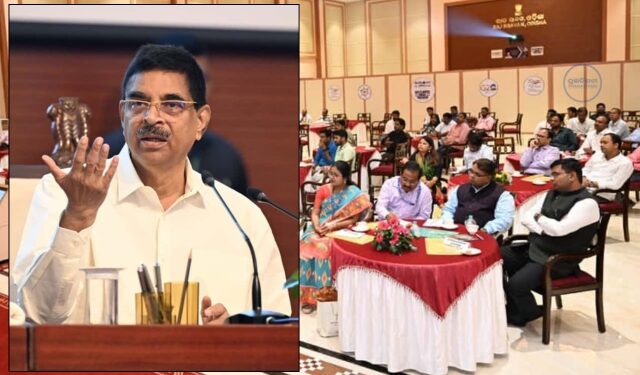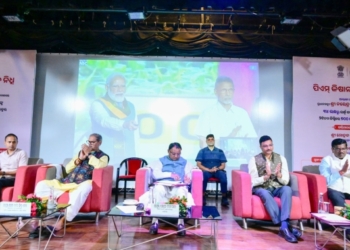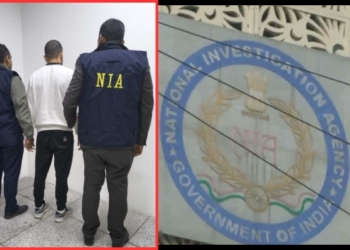Odisha Governor Dr Hari Babu Kambhampati has urged immediate measures to establish alcohol-free campuses and enhance security protocols across educational institutions.
Expressing deep concern over the rising incidents of violence against women, the Governor emphasised the need for expedited legislation to curb such crimes. He described recent tragic events in Balasore, Gopalpur, and Durgapur as “unfortunate” and stressed that the fear of stringent punishment would deter perpetrators. “If there is fear of punishment, criminals will hesitate to commit offences. Therefore, strict enforcement will lead to a decline in crimes,” the Governor stated while responding to queries from media representatives on the increasing violence against women in the state.
During an interactive session with journalists at Raj Bhavan on Friday, Governor Dr Kambhampati shared insightful observations on a wide array of issues, from border disputes to economic self-reliance. He underscored that resolutions to challenges like inter-state border conflicts and the Mahanadi water dispute can only be achieved through mutual consensus between the involved parties.
In a significant announcement regarding higher education, the Governor revealed that all vacant Vice-Chancellor (VC) positions in universities will be filled within the next 2 to 3 months. Prioritising the new universities, he said appointments would first be made under the fresh Universities and Research Institutions Act, followed by filling professor vacancies. “In most universities, in-charge VCs are creating serious disruptions in teaching activities,” he noted, highlighting the urgency of these appointments to restore academic normalcy.
The Governor also voiced alarm over the high school dropout rates, particularly in tribal-dominated regions. He pointed out that dropout rates are alarmingly high after Class 10, with many students forgoing higher education. To address this, he suggested elevating Class 10 students to unified higher secondary schools, which could significantly reduce dropouts in the coming years.
Praising Odisha’s robust economic standing compared to other states, Governor Kambhampati described the state’s future as “bright.” However, he advocated for greater self-reliance in production sectors, alongside accelerated infrastructure development in roads and rail connectivity. On migration, he identified two primary types: professionals seeking opportunities abroad and unskilled workers migrating due to lack of local jobs. He commended the state government’s multiple schemes aimed at curbing this outflow.
Highlighting the role of various government schemes, the Governor said they provide crucial economic and social security, ensuring future needs are met and improving citizens’ quality of life. “Greater awareness will enable more people to benefit from savings, pensions, and insurance programs for their children, fostering family stability and welfare across the state,” he added, calling on the media to disseminate information about these welfare initiatives to the public.
Addressing vacancies in ministerial posts and chairmanships of various corporations, the Governor clarified that these fall entirely under the Chief Minister’s purview. However, he advised the government to expedite filling empty positions in corporations, boards, and commissions. On the pending Professional Tax Bill, he noted that a draft proposal is ready and urged the administration to prioritise its notification.
Looking ahead to 2036, the Governor expressed optimism about achieving the vision of a “Developed Odisha.” He highlighted the government’s focus on infrastructure and industrial growth, including rail connectivity projects worth Rs 80,000 crore and investment proposals exceeding Rs 12 lakh crore from the recent Industrial Mahakumbh. “These initiatives will propel the state toward its development goals,” he affirmed.
Regarding the Koraput border dispute, the Governor stated that border residents already enjoy benefits from both states, but emphasised that a permanent resolution must emerge from amicable bilateral discussions. On the Mahanadi water dispute, he welcomed recent constructive talks between the Odisha and Chhattisgarh governments, reiterating the need for a negotiated settlement through mutual understanding.
Concluding the session, Governor Kambhampati shared his personal impressions of Odisha, saying he has been most profoundly influenced by the state’s rich art forms and the art-loving populace. The event was coordinated by the Governor’s Secretary, Roopa Roshan Sahu.






























